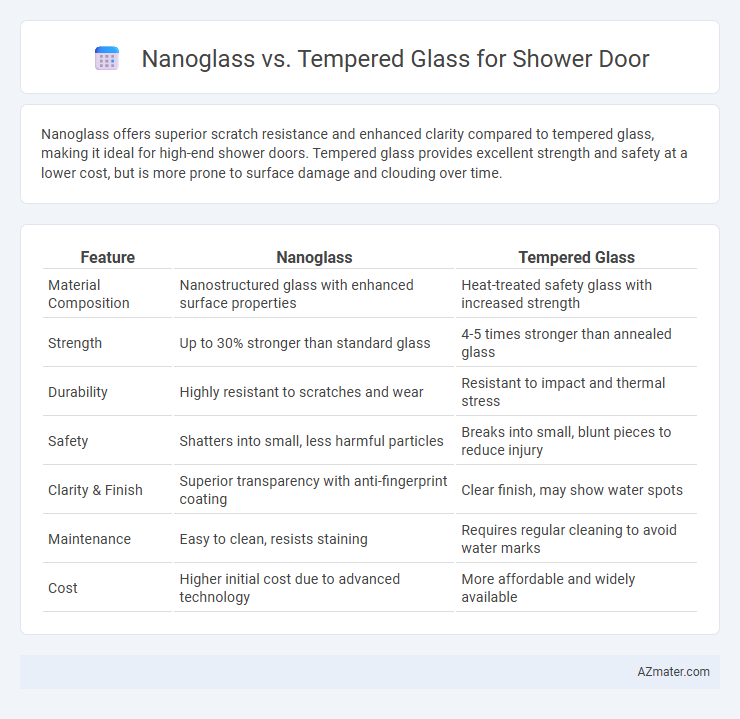Nanoglass offers superior scratch resistance and enhanced clarity compared to tempered glass, making it ideal for high-end shower doors. Tempered glass provides excellent strength and safety at a lower cost, but is more prone to surface damage and clouding over time.
Table of Comparison
| Feature | Nanoglass | Tempered Glass |
|---|---|---|
| Material Composition | Nanostructured glass with enhanced surface properties | Heat-treated safety glass with increased strength |
| Strength | Up to 30% stronger than standard glass | 4-5 times stronger than annealed glass |
| Durability | Highly resistant to scratches and wear | Resistant to impact and thermal stress |
| Safety | Shatters into small, less harmful particles | Breaks into small, blunt pieces to reduce injury |
| Clarity & Finish | Superior transparency with anti-fingerprint coating | Clear finish, may show water spots |
| Maintenance | Easy to clean, resists staining | Requires regular cleaning to avoid water marks |
| Cost | Higher initial cost due to advanced technology | More affordable and widely available |
Introduction to Shower Door Glass Options
Nanoglass and tempered glass are popular materials for shower doors, each offering unique benefits tailored to bathroom environments. Nanoglass features a hydrophobic coating that repels water, reduces stains, and simplifies cleaning, making it ideal for maintaining clarity and hygiene. Tempered glass provides exceptional strength and safety through heat treatment, ensuring durability against impacts and thermal stress, which is crucial for preventing shattering in humid shower conditions.
What Is Nanoglass?
Nanoglass is an advanced shower door material featuring a microscopic coating that repels water, dirt, and soap scum, ensuring effortless cleaning and enhanced durability compared to traditional tempered glass. Tempered glass, heat-treated for strength and safety, can resist impact but lacks the hydrophobic and stain-resistant properties of nanoglass. Nanoglass surfaces maintain clarity and prevent mineral buildup, making them highly effective in wet environments like showers.
What Is Tempered Glass?
Tempered glass is a type of safety glass processed by controlled thermal or chemical treatments to increase its strength compared to normal glass. When broken, it shatters into small, blunt pieces, reducing the risk of injury, making it a popular choice for shower doors. Its durability and resistance to impact and heat make tempered glass an industry standard in bathroom safety and design.
Durability Comparison: Nanoglass vs Tempered Glass
Nanoglass offers superior durability compared to tempered glass for shower doors due to its advanced nano-coating technology that enhances scratch resistance and prevents water stains. Tempered glass, while strong and resistant to breakage, lacks the hydrophobic properties of nanoglass that contribute to long-term clarity and ease of maintenance. In high-moisture environments, nanoglass maintains its structural integrity and appearance better than traditional tempered glass, making it a more durable choice for shower enclosures.
Safety Features of Nanoglass and Tempered Glass
Nanoglass for shower doors offers enhanced safety features with its superior shatter resistance and self-healing properties, reducing the risk of sharp glass fragments during accidental impacts. Tempered glass, on the other hand, is designed to break into small, blunt pieces that minimize injury, providing reliable safety through controlled fragmentation. Both materials meet stringent safety standards, but Nanoglass's advanced durability and impact absorption make it a cutting-edge choice for safer shower enclosures.
Aesthetic Appeal: Clarity and Finish
Nanoglass offers superior clarity with its ultra-smooth, non-porous surface that minimizes water spots and streaks, enhancing the shower door's aesthetic appeal. Tempered glass, while durable, often exhibits slight distortions and more visible watermarks due to its textured finish. The polished, sleek finish of nanoglass maintains a pristine, modern look longer, making it a preferred choice for a high-end shower enclosure.
Maintenance and Cleaning Differences
Nanoglass shower doors feature a hydrophobic nano-coating that repels water and reduces soap scum buildup, making maintenance easier compared to traditional tempered glass. Tempered glass requires more frequent cleaning to prevent water spots and mineral deposits, often needing stronger cleaning agents. The durable coating on nanoglass surfaces also resists scratches and stains, extending the lifespan and clarity of the shower door with minimal effort.
Cost Analysis: Nanoglass vs Tempered Glass
Nanoglass shower doors generally command a higher upfront cost due to their advanced nanoparticle coating technology, which enhances durability and water repellency compared to traditional tempered glass. Tempered glass offers a more affordable option with sufficient strength and safety features but may require more frequent cleaning and potential replacement over time due to surface wear. Considering long-term maintenance expenses, nanoglass can offer cost savings by reducing the need for harsh cleaning agents and minimizing mineral buildup, making it a competitive investment despite the initial price difference.
Environmental Impact and Sustainability
Nanoglass for shower doors offers enhanced recyclability and lower energy consumption during manufacturing compared to tempered glass, which requires high heat treatment that contributes to a larger carbon footprint. Nanoglass materials often use eco-friendly coatings that reduce water and chemical usage in maintenance, improving long-term sustainability. Tempered glass, while durable, poses challenges in recycling due to stress-induced internal changes, making nanoglass a more environmentally responsible choice for modern bathroom designs.
Which Glass Type Is Best for Your Shower Door?
Nanoglass offers superior water repellency and easier cleaning compared to tempered glass, making it ideal for maintaining a spotless shower door. Tempered glass provides enhanced strength and safety, as it shatters into small, less dangerous pieces upon impact. For durability and low maintenance, nanoglass is best, while tempered glass excels in impact resistance and safety features.

Infographic: Nanoglass vs Tempered glass for Shower door
 azmater.com
azmater.com